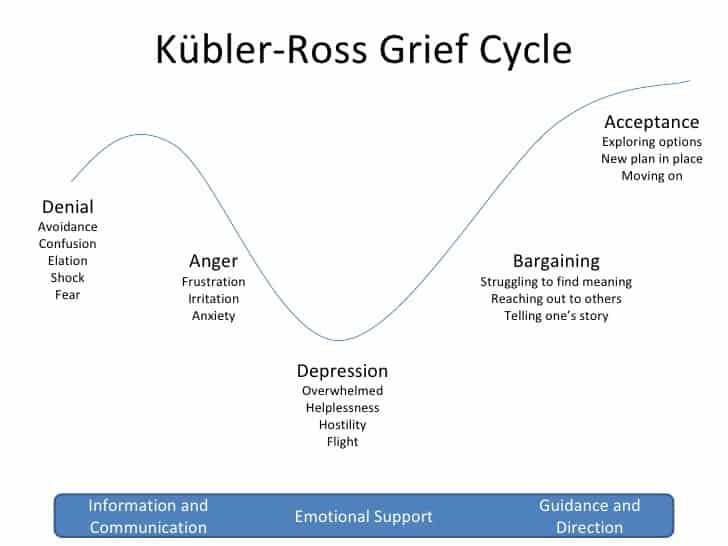Sleep and Grief
Disclosure: By clicking on the product links in this article, Mattress Nerd may receive a commission fee at no cost to you, the reader. Read full disclosure statement.
Grief is a natural and normal response to loss. It is felt profoundly, yet differently, by everyone. There is no right or wrong way to grieve. It is a journey that we are forced to undertake when we lose someone we care about. Understanding grief, however, doesn’t make it any less difficult or painful.
Grief is felt on an emotional level, but also on a physical level. Your heart can literally ache. A memory can cause your stomach to lurch. A photograph can make tears well in your eyes. Some nights, your mind races so fast that you cannot sleep. Other times you feel you could sleep all day.
“If we let the despair set in, all aspects of life, including our sleep, will be negatively impacted. We will either have a hard time falling asleep or sleep excessively to escape reality,” said Dr. J. Salim, a dentist with Sutton Place Dental Associates in New York specializing in sleep apnea. “The net effect of these two possibilities is anxiety, lethargy, fatigue, loss of productivity, despair, hopelessness, compromises health, weight gain, and loss of will and motivation to advance in life.”
The truth is, insomnia and hypersomnia (excessive sleepiness or drowsiness) are not an uncommon symptom of grieving. And they can make the pain and anguish of grief worse. But there are things you can do to help you get the rest you need. And, in time, the intensity of your grief should become more manageable.

Causes of Grief
Grief is the result of loss that is usually associated with the death of a loved one. But there are other causes of grief:
- Loss of a loved one through relationship breakup or divorce.
- Personal loss of one’s own abilities, health, or well-being due to illness or injury.
- Loss of a job, financial security, or social status.
- The physical absence of someone whose fate is unknown, such as in the case of a kidnapped or missing children or lost soldiers.
- The psychological loss of someone who is physically present but mentally absent, such as a loved one with dementia.
- Disenfranchised losses, such as the loss of a pregnancy, pet, home, etc.
The Stages of Grief
Grief is the response to loss. Bereavement is the profound absence felt when someone you love is gone. Both are common reactions when someone you love dies. These feelings gradually ease, but for some people, these emotions are debilitating and don’t improve in time. It becomes difficult to get on with your life. This is a condition known as complicated grief, and it often requires professional help to work through emotions so that you can learn to cope.
You may have heard about the Five Stages of Grief – the Kübler-Ross model that breaks grieving into five stages: denial, anger, bargaining, depression, and acceptance. It was written by Dr. Elisabeth Kübler-Ross, in 1969 in her book “On Death & Dying.” For decades, the Five Stages of Grief have served as a guide for people as they work through their grief. The stages aren’t necessarily linear. Some people experience all steps in order while others may experience them in a different order. Yet others may only feel a few of the emotions. Let’s take a closer look at the five stages:
- Denial: Disbelief in diagnosis or death.
- Anger: When it is understood that denial cannot continue, anger and frustration can set in.
- Bargaining: The hope of believing that the cause of grief can be avoided through negotiation.
- Depression: Deep sorrow over the loss.
- Acceptance: Realization that everything will be OK.
Acceptance doesn’t mean that grief ends. You will always mourn your loved one. But, in time, the pain should become more manageable.

The Connection between Grief and Sleep
During bereavement, we can experience a range of reactions. The pain of loss can be emotional and physical — your heart and body can actually ache. This alone can cause problems with sleep. But, combined with the emotional reactions — like sadness, loneliness, and anxiety — those who are grieving can either experience sleepless nights or seek escape in sleeping more.
For people with complicated grief, the risk for sleep disturbances appears to be greater as the condition is often accompanied by depression or post-traumatic stress disorder (PTSD).
A Rice University and Northwestern University study published in Psychosomatic Medicine found that people who recently lost a spouse were more likely to have disrupted sleep and that this fragmented sleep caused an increase in inflammation in their bodies two to three times higher than those who were not bereaved. If sleep did not improve, the researchers surmised, these widows and widowers could experience long-term inflammation, putting them at increased risk for cardiovascular disease.
“One of the biggest ways grief and sleep is connected is through dreams,” says Rebecca Ogle, a licensed Clinical Social Worker and therapist with Grounded Counseling in Chicago, Illinois. “Many grieving folks dream about their loved ones. If the dreams are upsetting this may cause them to dread sleeping and have trouble falling asleep.”
Others may oversleep. “This is due, in part, to the simple fact that grief is emotionally exhausting,” she adds. Many people who are grieving feel they need to put on a “brave face” for others who are concerned for them or in order to return to work. Yet, “internally they are miserable,” she says. “Not only is keeping up with this tiring, it can also lead to feelings of isolation, which leads to people spending time alone, which leads to lots of sleep.”
The Physical Symptoms of Grief
Licensed independent clinical social worker Howard Lunche, in his book, “Understanding Grief,” identified the symptoms of grief as being felt on several levels including physical, emotional, mental, social, behavioral, and spiritual.
Physical
- Headaches
- Chest pain
- Stomach issues
- Aches and soreness
- Shortness of breath
Emotional
- Shock
- Numbness
- Sadness
- Anger
- Guilt
Mental
- Anxiety
- Depression
- Forgetfulness
- Denial
- Low motivation
Social
- Isolation from others
- Withdrawing from social activities
- Loss of friends
Behavioral
- Crying
- Searching for deceased
- Avoiding places that arouse grief
Spiritual
- Questioning God
- Wondering where your loved one is
- Hearing or sensing the deceased is near
Lack of Sleep
- Insomnia — Symptoms of insomnia include difficulty falling asleep or awakening at night and having difficulty falling back to sleep. Insomnia is not uncommon after someone goes through the stress and trauma of losing a loved one.
- Physical pains from grief — The pain from grief is not only emotional, it can be physical as well. You become more aware of physical sensations like pain. Backaches, joint pain, headaches, and general stiffness and soreness are common side effects of grief. You may even feel a dull hollow in your gut.
Excess Sleep
- Hypersomnia — The overwhelming and constant exhaustion and sadness that accompanies grief can also cause excessive daytime sleepiness or oversleeping, a condition known as hypersomnia. This is a common symptom in people with depression. Hypersomnia symptoms include sleeping all day, taking a lot of naps during the day, going to bed early in the evening, or oversleeping in the morning.
- Depression (and its physical side effects) — Depression is a common symptom among those who are mourning the loss of a loved one. People who are depressed can experience significant weight gain or weight loss, psychomotor agitation, fatigue, feelings of worthlessness, inability to concentrate, marked loss of interest or pleasure in activities once enjoyed, and insomnia or hypersomnia.
Understanding different types of grief
Loss of a spouse
Whether you’ve been married a few years or several decades, losing your life partner is devastating. You may feel shocked or numb. You may experience survivor’s guilt for being the one who survived. You may even get mad at your deceased spouse for leaving you. All these emotions are normal as you work through your grief. A huge void has entered your life and you may feel lonely, scared, or anxious suddenly without your spouse. This is the time to take extra care of yourself. Studies have shown that after losing a spouse, the surviving spouse is at a 48% greater risk of dying.
Losing your life partner can be especially difficult at night. The empty space next to you in bed feels vast. It can be especially difficult falling asleep at night without your loved one. “If you’ve lost a partner, get a body pillow or let the dog sleep with you for a while,” suggests Dr. Brian Wind, a clinical psychologist and Chief Clinical Officer of Journey Pure. “You might also sleep on your partner’s side of the bed for a sense of closure.”
Loss of a parent
Regardless of your age or the closeness of your relationship, losing a parent is never easy. Your mother and father brought you into this world. Losing one or both can feel as if the anchor to your identity has been cut and you’re left adrift in the world without them. Studies have found that we identify the loss of a father and mother differently. The death of a father is like a loss of personal mastery. Fathers instilled in us the strategies and tools to help us live and work. Losing a mother, however, is felt on a more visceral level because of the nurturing role they played in our lives when we were young.
At night, you may find yourself lying in bed unable to sleep because your mind is flooded with thoughts. You may feel guilty for not spending more time with them, or grieve not having a better relationship with them. You may worry that you didn’t live up to their expectations. To calm a racing mind so you can sleep better, Dr. Wind suggests to “incorporate breathing exercises, meditation, or yoga into your pre-sleeping routine.” Seeing a therapist can also help you process those hurtful thoughts and emotions.
Loss of a child
Parents are supposed to outlive their children. Whether they are a toddler, teenager, or adult, when a child’s life is cut short, we are left grappling for understanding. The physical and emotional pain may be especially overwhelming if the death was sudden or unexpected. But even if death follows a lengthy and painful illness, there is little peace in losing a child. As parents, we are responsible for nurturing our children. When they die, you may feel as if you failed them. You may also feel as if you have lost a part of yourself because, quite literally, you have.
The pain of losing a child can be so overwhelming, it may be difficult to get out of bed in the morning. You may want to sleep the rest of your life away. “Most times, sleep is preferred instead of dealing with the devastation,” says Dr. Reneé Sunday, an anesthesiologist and motivational speaker.
Losing a child is a traumatic experience, and you may need professional help getting through it. Studies show that parents who do not work through their grief are at an increased risk for long-term mental and physical health consequences. A study published in JAMA found that therapy that resembles treatment for post-traumatic stress disorder (PTSD) was 25% more effective at helping people manage their grief than traditional therapy.
Loss due to suicide
Losing a loved one to suicide is a shocking and heart-wrenching experience. You may be struggling with guilt, anger, or confusion. You might ask yourself: “Could I have done something to prevent it?” Not only will you experience the physical and emotional symptoms of grief, you may also feel isolated. Many people have a difficult time talking about suicide and may not reach out to you because they don’t know what to say.
Guilt can wake you up at night, and painful thoughts of “what if” or “why” can keep you from falling back to sleep. You may even have thoughts of suicide. This is not unusual or uncommon. However, having these thoughts does not mean you will act on them. Keep asking yourself questions until you no longer need to ask, suggests the nonprofit SAVE (Suicide Awareness Voices of Education). Consider attending a support group for families who have been affected by suicide. Talking with others who know your pain can help you process your emotions. In time, you will be able to work through your anxious thoughts and get a good night’s sleep.
Loss of a pet
For many of us, pets are more than animals. They are beloved family members who fill our lives with joy and companionship. When a pet dies, the sense of loss you feel can be similar to losing a loved one. Some people may not understand your level of grief over a pet. They might tell you it’s time to “move on,” or that you’ll feel better if you get another pet. It’s not always that easy.
If your pet slept in your bedroom or in your bed, you will sense their absence at night. Even if your pet slept in a crate or cage, you can still feel the void knowing they are not in your home. The absence can make it difficult to fall asleep. “It may help to sleep with a stuffed animal, article of clothing, or even a photo that reminds you of them,” Ogle says. And actively do things to heal your heart, like reaching out to others who have lost pets, holding a funeral, or ceremoniously scattering your pet’s ashes. Also, take care of yourself. Because in grief you are at greater risk for accidents, illnesses, and general aches and pains.
Loss due to COVID-19
COVID-19 has created angst for many of us. But losing a loved one during a global pandemic can be devastating, especially if you were unable to say goodbye to your loved one in person due to efforts to stop the spread of the virus. You may have been faced with the decision to take your loved one off life support, a particularly difficult experience to reason with if your loved one was healthy before contracting the virus.
You may lie awake at night, searching for understanding. Or wake in the night consumed with grief, anger, or anxiety. It is normal to feel overwhelmed with emotion, especially since social distancing can make it challenging to receive hugs of comfort from others. Find your own comfort by making your bedroom into a sanctuary, Dr. Wind says. “Make sure your bedroom is dark and at a cool temperature for sleeping,” and that your mattress and bedding are comfortable and supportive. As you work through your grief, sleep will come easier.

Sleep Tips for Grieving
Grieving isn’t a “one size fits all” process. Everyone grieves differently. And you cannot compare your mourning with another’s because it won’t necessarily look the same. Some of us cry, look sad and withdraw from others. Some of us grieve in private while trying to convince others we are fine. Still, some of us cope by staying busy, afraid if we slow down, we will have to face the pain of our loss. Many of us, however, suffer from sleep disturbances following the loss of a loved one. But there are things you can do to help you get a better night’s sleep:
Sleep hygiene and routine
- Sleeping/bedroom environment — Your bedroom should be a sanctuary only for sleep and sex. Use blackout curtains to block out light, set the thermostat at a cool but comfortable temperature, use a sound machine to block out noise and lull you to sleep.
- New mattress and bedding — Old, sagging mattresses can impede your best efforts to sleep. Consider a new memory foam, latex, or hybrid mattress that offers comfort and support. New mattresses also offer performance factors that traditional innerspring beds don’t like pressure point relief and spinal alignment to help reduce aches and pains.
- Exercise at appropriate times — Exercise is a great way to burn off stress and anxiety and to prepare your body for sleep. But don’t do any strenuous exercise within three hours of bedtime. Exercise releases endorphins, the “feel-good” chemical, that can overstimulate you and keep you from sleeping.
- Avoiding alcohol/drugs/stimulants before bed — Alcohol can make you sleepy, which may seem ideal when you have trouble sleeping. But too much alcohol too close to bedtime can make you wake up during the night and have trouble falling back to sleep. Coffee and caffeinated drinks are stimulating and if consumed too close to bedtime can keep you from falling asleep.
- Blue light exposure before bed — It may be tempting to look at your phone or watch TV to help you fall asleep at night. But these devices emit blue light, which blocks the body’s natural sleep hormone, melatonin, and thus interferes with your ability to fall asleep.
- Room temperature — A room that is too hot or too cold can make sleep downright uncomfortable. For most people a temperature between 65 and 72 degrees is ideal for sleep.
- Sleep schedule — Maintaining a regular bedtime and wake up time can keep your circadian rhythm in check. The circadian rhythm is the body’s internal 24-hour clock that governs your sleep-wake cycle.
Relaxation techniques
- Meditation — Taking time to practice mindfulness or focus your mind on a particular thought or object can help clear your mind and reduce stress, and can ultimately help you sleep better. Meditation apps are a great resource for this.
- Breathing exercises — Breathing can be a powerful tool for reducing anxiety and can help you wind down before bedtime. Focus on taking slow, deep breaths, breathing in and out through the nose, allowing your belly to fill with air.
- Acupressure — Acupressure is based on the same traditional Chinese medicine principles as acupuncture to relieve stress, but it uses pressure instead of needles on certain points on the body. You can do acupressure on yourself by simply applying pressure with your fingers to the same points targeted by acupuncture.
Seek help
Grief is a deeply personal experience, but you don’t have to go through it alone. Talk to a trusted friend, a family member, or seek out support groups where you can share with others who have experienced similar pains. If you are having an especially difficult time with your grief and time doesn’t seem to heal your wound, talk with a therapist or psychologist specialized in grief counseling.
Final Thoughts
Grief is a natural and normal response to loss that can lead to sleepless nights. Insomnia and hypersomnia are common side effects of grieving. Just as the intensity of your pain becomes more manageable in time, so should your sleep. And as your sleep improves, so will your ability to handle your grief.
If you need additional help, call the U.S. Department of Health and Human Services’ National Helpline at 1-800-662-HELP (4357).


